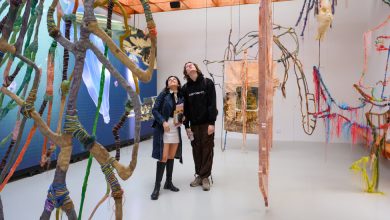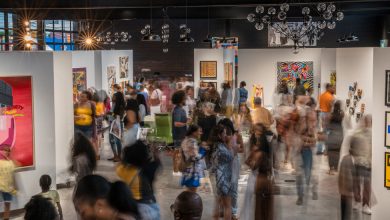Carlisle Floyd: Artists Share Memories of a Composer

The career of the American composer Carlisle Floyd, who died on Thursday at 95, spanned nearly 70 years and the heydays of a host of musical styles. But through them all, Floyd stayed stubbornly true to himself and his vision: creating operas with clear, strong narratives — often about intolerance and social outcasts — and scores grounded in tonality.
While some academics and critics who favored a thornier modernism found Floyd’s works simplistic, artists and audiences embraced his compelling characters and passionate music.
Here are edited excerpts from interviews about him with the tenor Anthony Dean Griffey, famed as Lennie in Floyd’s adaptation of “Of Mice and Men”; the conductor Patrick Summers, a frequent collaborator and Houston Grand Opera’s music director since 1998; and David Gockley, who as general director of the Houston company from 1972 to 2005 presented six of Floyd’s works.
Anthony Dean Griffey
When I started singing, I had a close connection to outsider characters, because I felt a bit like an outsider when I was growing up in North Carolina. I’m a large guy, and that got pointed out.
In 1997, Glimmerglass Opera in upstate New York contacted the Metropolitan Opera, where I was in the young artists program, and said they were auditioning for Lennie in “Of Mice and Men.” I had worked every summer with special needs children and adults, so I really knew the character. The audition was the next day, so I learned the “mice aria” overnight. And I was cast, and my life changed forever. Carlisle’s music gave me a place in the opera world that I didn’t think I could have.
After Glimmerglass, it took off and went to New York City Opera, and then I sang it at one opera house after another. I was concerned about being typecast, and maybe I was, but I didn’t mind that. I’d rather at the end of my career and life be known for a role that really made a difference, rather than 120 roles and no one knew what I did.
I felt that Carlisle captured Lennie perfectly. The part is quite rangy, and for me the challenge was keeping his innocence while singing a very wide range in terms of the tessitura. Lennie has different emotions, very sporadically. He can turn on a dime. He’s lyrical when he dreams about his future with George and the rabbits and chickens, but his outbursts are dramatic and heavy. I’ve always thought of myself as an actor who sings and a singer who acts. So I made sounds that were not always beautiful tones, but they were what Lennie would have done.
Carlisle was hands-off. I’ve done a lot of new music and sometimes composers have very specific ideas and get in the way of your interpretation. But he gave me the license to almost recreate the role. He was always complimentary, kind and generous. And always thanked me. I felt like I should be the one to thank him. I grew up very poor, and being able to buy my mother a house she could call her own — that was like Lennie’s dream. I call my mom’s house The House That Lennie Built.
Patrick Summers
When we did “Of Mice and Men” at the Bregenz Festival in Austria, I was the one — not Carlisle — worried that his musical idiom might not totally translate into the land of Schubert and Strauss and European modernism. He had none of those worries. And the Austrian audiences reacted so well to that opera because it’s great. Audiences don’t care about theory; the idea that musical language has to be somehow dumbed down to be accessible is very much a construct of criticism and academia. And though he was an academician himself his whole life, Carlisle never wrote in that world. He stuck to his guns, and his guns just happened to be in G minor. The subject of a great many of his operas is hypocrisy, and the effect of a crowd on an individual. That was the dominant theme of his life: how to be true to yourself.
He never wrote outside his own voice. I had so many conversations with him about various composers — Pierre Boulez and Elliott Carter and John Adams — whom Carlisle loved. But it just wasn’t how he wrote. Most of his subjects were American, but not all. He did a gorgeous “Wuthering Heights,” and his last opera, “Prince of Players,” was British-set. But largely he was attracted to American stories, and writing in the American vernacular was as natural to him as anything, though he didn’t like the term “folk opera,” which he was branded with because of “Susannah.” And that was kind of an anomaly; it’s the only really folkish work that he wrote, even with the Americana, Copland feel in “Of Mice and Men.” In general he assimilated all kinds of traditions and made them his own. That’s what this country does.
He thought in terms of big orchestras; he was very much of that era. And the psychological world of his operas is in the orchestra. But he was a story person, a narrative person. If the story required a great and memorable tune, he provided it. If the story needed very thorny dissonance, he provided that. He was a servant of the narrative.
Carlisle absolutely loved what he did. He loved going to performances; he loved his fellow composers; he loved their success. This was a great, grand gentleman. He didn’t play all those games that so many people play. And I think one hears that honesty and that geniality in his music.
David Gockley
In the late 1960s, my wife at the time, a soprano named Patricia Wise, had sheet music for the two arias from “Susannah.” I was really impressed: Here was modern opera that was beautiful, touching and — I hate to say it — listenable.
Soon after, I got the job in Houston, and just after I did I went to Cincinnati Opera to hear “Of Mice and Men,” which is when I first met Carlisle. Having heard that opera, I told him that during my first season as general director I was going to program it in Houston, and I offered to commission a work that turned out to be “Bilby’s Doll,” the start of a series of new operas he did there. He was also offered a position at the University of Houston, so he and his wife, Kay, made the move. Our relationship began to flower, and we became tennis buddies. Looking back, he is — was — my best friend.
I left the subject of his operas to him, but virtually all of his ideas were brought to life. My favorites, I think, are “Susannah,” “Of Mice and Men” and, I would say, “Cold Sassy Tree.” He brought that book to me as an idea; I read it and I thought it was charming and folksy, bringing forth characters that were familiar from his previous works but taking them further. It came out of a period in his life when he was suffering from serious depression. He always had his demons, but he said my encouragement of “Cold Sassy Tree” brought him through a really terrible period, and got him to the other side. Obviously I was glad to have played that part.
We very seldom were at odds. I felt that my job was to facilitate getting the operas from his head to the stage, and getting co-producers involved. That meant that the works would get automatic revivals in different cities. It was a great formula.
He and I developed the Houston Grand Opera Studio in the late ’70s because both of us were very interested in providing opportunities for young artists. In the ’50s, rising Americans had to go to Europe, so this was an alternative. We wanted to use the opportunity of Carlisle’s appointment at the University of Houston to bring the university into partnership with us. And they put forward a good deal of money over a period of time to provide fellowships to engage faculty, and we had studio productions that were given on the campus.
I think his legacy is probably six significant works that are worthy of the repertoire. I think that if you talk to someone like Jake Heggie, there’s a whole generation of composers who look to Carlisle like a godfather. He and his work gave them the confidence to have their own voices and to have those voices be loved by contemporary audiences.





